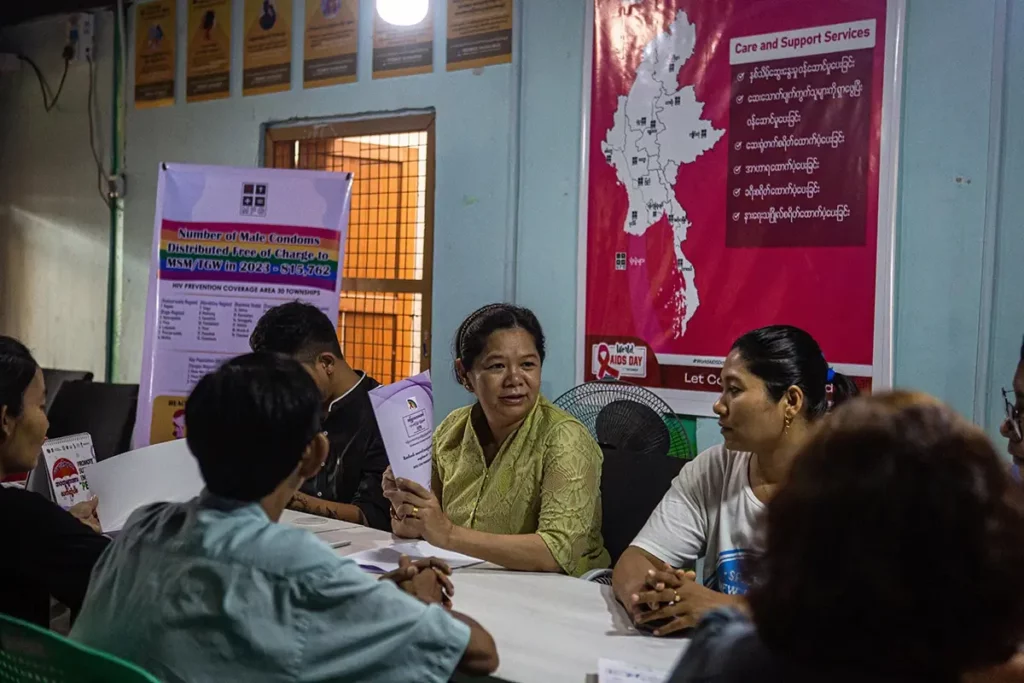
“I thought that if my lifespan is limited, it would be important to me to spend my remaining years meaningfully for people who need me,” says Mrs Thaung, activist and network coordinator for the Myanmar Positive Group
In Myanmar, escalating armed conflict has led to low staffing at health-care centres and numerous movement restrictions, including roadblocks and curfews, making it challenging for people living with HIV to travel safely and collect their medicines regularly.
Mrs Thaung is a former civil engineer and now an activist and network coordinator for the Myanmar Positive Group. As conflict escalated in December 2023 in Northern Shan State and nearby townships in Lashio, she knew that an emergency response was needed quickly to ensure uninterrupted access to antiretroviral medicines. Coordinating with the Joint United Nations Programme on HIV/AIDS, the National AIDS Programme and the World Health Organization, and within a timeframe of 15 days, the Myanmar Positive Group set up an emergency response team of nine people. The team successfully contacted 1089 people living with HIV and assisted them to receive multimonth supplies of antiretroviral medicines. The National AIDS Programme instituted extended clinic consultation hours and viral load testing integrated with medicine collections to ensure more than 1400 people received HIV services, despite significant challenges with connectivity and communications.
Mrs Thaung says, “We continue to coordinate with the National AIDS Programme during periods of high conflict to communicate the needs of people living with HIV and to ensure multimonth dispensing of antiretroviral therapy is going as smoothly as possible.”
For Mrs Thaung, her work is personal. Her husband’s positive HIV diagnosis prompted her to get tested during her pregnancy in 2001. She also tested positive. She says, “I was deeply depressed, and I had a lot of internalized. I spent all my savings trying to survive, and then my husband passed away.” In 2005, while collecting her medicines at Waibagi Hospital in Yangon, she met some people who were newly diagnosed with HIV. “They were going through the same emotional turmoil I had been through.”
This prompted Mrs Thaung to leave her civil engineering job and train as a counsellor with the Myanmar Positive Group. Today, as network coordinator for the organization, she communicates daily with multiple stakeholders to deliver antiretroviral medicines in conflict environments. A cancer scare in 2019 cemented her motivation even further: “I thought that if my lifespan is limited, it would be important to me to spend my remaining years meaningfully for people who need me.”
The conflict in Myanmar has led to the displacement of almost three million people,* with more than 660 000 people newly displaced in the northern and southern Shan, Rakhine, south-east and north-west regions. There are numerous threats to life due to violent conflict.*
Mrs Thaung remains steadfast: “I am proud of having led Myanmar Positive Group towards becoming a trusted organization in these parts. And I am proud of my emergency response team that demonstrates passion, empathy and commitment daily under heavy security risks, from floods to violence to heavy fighting.”
The available 2023 data for Myanmar show that 77% [60–93%] of people living with HIV are on treatment and 96% [75–>98%] of those on treatment are virally suppressed.
* Myanmar: Intensification of Clashes Flash Update #10 (as of 15 December 2023) [EN/MY] | OCHA (unocha.org)